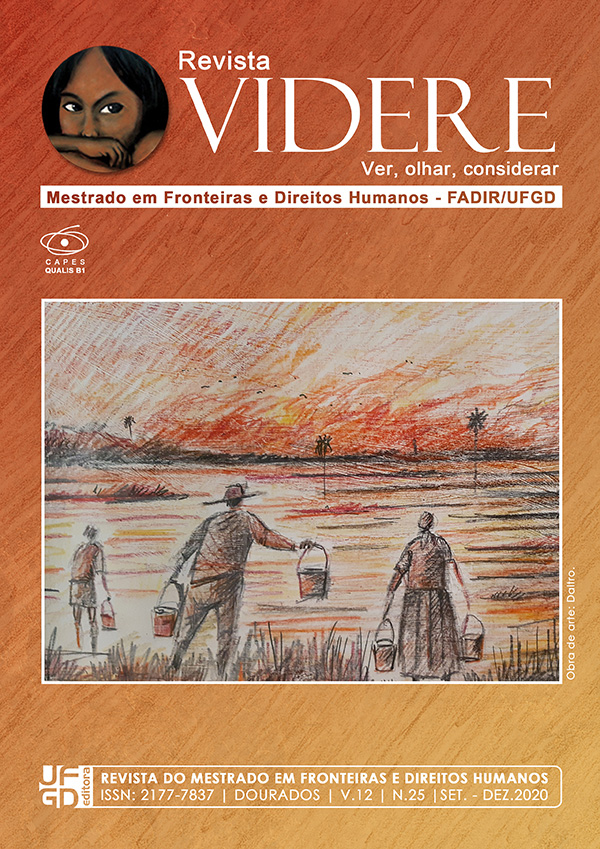Justiça e igualdade para pessoas com deficiências: a deficiência como uma das fronteiras da Justiça de Rawls
DOI:
https://doi.org/10.30612/videre.v12i25.13310Palavras-chave:
Justiça. Igualdade. Pessoas com Deficiência. Cuidado. Capacidades.Resumo
Pessoas consideradas como não-cooperativas, com funcionamentos anormais, abaixo de uma linha de capacidades básicas ou dependentes têm sido tradicionalmente excluídas do manto da justiça. Em atenção a esse problema, nosso objetivo é analisar o conceito de justiça de Rawls no tocante à inclusão de pessoas com deficiência, tanto no momento da composição da justiça, no consenso hipotético da posição original, quanto no momento da aplicação das regras da justiça arquitetada. Identificamos quatro clivagens da teoria de justiça rawlsiana que impedem o acolhimento da deficiência: o véu da ignorância cominado com a igualdade hipotética; o leque normal de variação; as desigualdades naturais consideradas no princípio da diferença; e a conceituação de “pessoas éticas”. Em um segunda incursão, relatamos as críticas de Kittay, no âmbito da ética do cuidado e da interdependência, e de Nussbaum, no contexto da abordagem das capacidades. Nossa metodologia é hipotético-dedutiva, com abordagem qualitativo-descritiva e com aporte na revisão bibliográfica.
Downloads
Referências
ARISTÓTELES. Ética à Nicômaco. São Paulo. Nova Cultural: 1996.
BARBOSA-FOHRMANN, Ana Paula. Os modelos médico e social de deficiência a partir dos significados de segregação e inclusão nos discursos de Michel Foucault e de Martha Nussbaum. REI-REVISTA ESTUDOS INSTITUCIONAIS, v. 2, n. 2, p. 736-755, 2017.
BARBOSA-FOHRMANN, Ana Paula; ANGELICA, Thiago da Costa Sá. Crianças com deficiência e o acesso à educação fundamental no Brasil: inclusão ou integração? Uma análise a partir do direito constitucional. Pensar-Revista de Ciências Jurídicas, v. 19, n. 1, p. 9-34, 2014.
BOBBIO, Norberto. Igualdade e Liberdade. 2. ed. Rio de Janeiro: Ediouro, 1997.
CARLSON, Licia; KITTAY, Eva Feder. Introduction: Rethinking philosophical presumptions in light of cognitive disability. Metaphilosophy, v. 40, n. 3‐4, p. 307-330, 2009.
CUENCA, Patricia. Disability and Humans Rights: A Theoretical Analysis. The Age of Human Rights Journal, n. 4, p. 34-59, 2015.
CUENCA, Patricia. Sobre la inclusión de la discapacidad en la teoría de los derechos humanos. In: Revista de Estudios Políticos (nueva época). Madrid, n. 158, octubre-diciembre, 2012.
CUENCA, Patricia. Derechos humanos y discapacidad: de la renovación del discurso justificatorio al reconocimiento de nuevos derechos. Anuario de filosofía del derecho, n. 32, p. 53-83, 2016.
DEGENER, Theresia. Disability in a Human Rights Context. Laws. vol. 5 no. 3. 2016.
DINIZ, Débora. Quem Autoriza o Aborto Seletivo no Brasil? Médicos, Promotores e Juízes em Cena. In: PHYSIS: Rev. Saúde Coletiva, Rio de Janeiro, 13(2):13-34, 2003.
FRENCH, Sally et al. Whose Tragedy: Towards a personal non-tragedy view of disability. In: SWAIN, John. et al (eds) Disabling Barriers – Enabling Environments. 2. ed. London: Sage, 2004.
KITTAY, Eva. Love’s Labor: essays on women, equality and dependency. New York: Routledge. 1999.
KITTAY, Eva Feder. When caring is just and justice is caring: Justice and mental retardation. Public Culture, v. 13, n. 3, p. 557-579, 2001.
NUSSBAUM, Martha. The capabilities of people with cognitive disabilities. Metaphilosophy, v. 40, n. 3‐4, p. 331-351, 2009.
NUSSBAUM, Martha C. Fronteiras da justiça: deficiência, nacionalidade, pertencimento à espécie. Tradução de Susana de Castro. São Paulo: WMF Martins Fontes, 2013.
RALWS, John. Justiça como eqüidade: uma concepção política, não metafísica. Lua Nova, São Paulo, n. 25, p. 25-59, Apr. 1992.
RALWS, John. O liberalismo político. Trad. Dinah de Abreu Azevedo. 2. ed. 2. Imp. São Paulo: ed. Ática. 2000.
RALWS, John. Uma teoria de Justiça. Trad. Almiro Pisetta e Lenitta M. R. Esteves. São Paulo: Martins Fontes. 1997.
SHAKESPEARE, Tom. Disability rights and wrongs revisited. 2 ed. Londres, Nova York: Routledge. 2014.
SILVERS, Anita. Reconciling Equality To Difference: Caring (F)or Justice For People With Disabilities, Hypatia, v. 10, p. 30-55, 2009.
SILVERS, Anita; FRANCIS, Leslie Pickering. Justice through trust: Disability and the “outlier problem” in social contract theory. Ethics, v. 116, n. 1, p. 40-76, 2005.
SILVERS, Anita. Thinking about the good: Reconfiguring liberal metaphysics (or not) for people with cognitive disabilities. Metaphilosophy, v. 40, n. 3‐4, p. 475-498, 2009.
STEIN, Michael. Disability Human Rights, California Law Review, v. 95. N. 1, p. 75-121. 2007.
VITA, Álvaro de. Uma concepção liberal-igualitária de justiça distributiva. Revista Brasileira de Ciências Sociais, v. 14, n. 39, p. 41-59, 1999.
WASSERMAN, David et al. Disability and justice. In: Zalta, Edward N. et al (ed). The Stanford Encyclopedia of Philosophy. Palo Alto: Stanford University, 2013.
WONG, Sophia Isako. Duties of justice to citizens with cognitive disabilities. Metaphilosophy, v. 40, n. 3‐4, p. 382-401, 2009.
Downloads
Publicado
Como Citar
Edição
Seção
Licença
Os autores devem aceitar as normas de publicação ao submeterem a revista, bem como, concordam com os seguintes termos:
(a) O Conselho Editorial se reserva ao direito de efetuar, nos originais, alterações da Língua portuguesa para se manter o padrão culto da língua, respeitando, porém, o estilo dos autores.
(b) Autores mantém os direitos autorais e concedem à revista o direito de primeira publicação, com o trabalho simultaneamente licenciado sob a Atribuição-NãoComercial-CompartilhaIgual 3.0 Brasil (CC BY-NC-SA 3.0 BR) que permite: Compartilhar — copiar e redistribuir o material em qualquer suporte ou formato e Adaptar — remixar, transformar, e criar a partir do material. A CC BY-NC-SA 3.0 BR considera os termos seguintes:
- Atribuição — Você deve dar o crédito apropriado, prover um link para a licença e indicar se mudanças foram feitas. Você deve fazê-lo em qualquer circunstância razoável, mas de nenhuma maneira que sugira que o licenciante apoia você ou o seu uso.
- NãoComercial — Você não pode usar o material para fins comerciais.
- CompartilhaIgual — Se você remixar, transformar, ou criar a partir do material, tem de distribuir as suas contribuições sob a mesma licença que o original.
- Sem restrições adicionais — Você não pode aplicar termos jurídicos ou medidas de caráter tecnológico que restrinjam legalmente outros de fazerem algo que a licença permita.



















